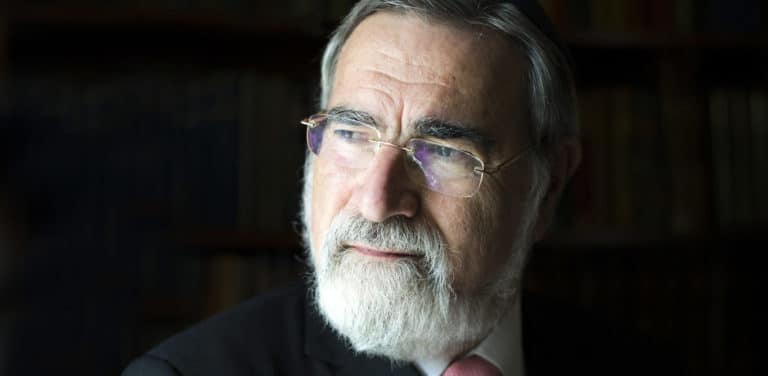
In his book “Radical Then, Radical Now,” Rabbi Jonathan Sacks quoted an idea from the Baal Shem Tov — the founder of Hasidism — who explained that the Jewish people is a living Torah scroll, and every Jew is one of its letters. The Torah is the story of the Jewish People and to be a Jew is to continue that story. Rabbi Sacks taught us to always be proud of that story and of being a part of it, to learn from it and to proudly pass it on to the next generation. With his passing it is up to each and every one of us to continue the story — to write the next chapter.
Although Rabbi Sacks is no longer among the living, his gift to all of us was the toolkit he provided for how to live a meaningful, sensitive Jewish life, and how to pass the tradition to each generation.
Rabbi Sacks was an inspiration to millions of people, Jews and non-Jews alike. Although his passing is a profound loss for the world, his ideas on a wide range of topics — such as monotheism, religion, morality, philosophy, leadership, politics and education — will undoubtedly live on. To celebrate his life and legacy, we’ve collected 10 of our favorite teachings and quotes from Rabbi Sacks.
While the pain of loss of a giant like Rabbi Sacks is palpable for each of us, he embodies the idea from the tractate of Berakhot that declares, “The righteous, even in their death, are called alive.” Rabbi Sacks was a great leader, and as he famously said, “Good leaders create followers. Great leaders create leaders.” His Torah, his ideas, his insights, his wisdom and his guidance all live on, and it is our responsibility to live according to his teachings. More than that, it is our responsibility to teach his ideas to others. If we do that, Rabbi Sacks zt’l is very much alive.
1. The Power of Empathy:
Rabbi Sacks told a story about the power of empathy:
“William Ury, founder of the Harvard Program of Negotiation, tells a marvellous story in one of his books. A young American, living in Japan to study aikido, was sitting one afternoon in a train in the suburbs of Tokyo. The carriage was half empty. There were some mothers with children, and elderly people going shopping.
Then at one of the stations, the doors opened, and a man staggered into the carriage, shouting, drunk, dirty, and aggressive. He started cursing the people, and lunged at a woman holding a baby. The blow hit her and sent her into the lap of an elderly couple. They jumped up and ran to the other end of the carriage. This angered the drunk, who went after them, grabbing a metal pole and trying to wrench it out of its socket. It was a dangerous situation, and the young student readied himself for a fight.
Before he could do so, however, a small, elderly man in his seventies, dressed in a kimono, shouted “Hey” to the drunk in a friendly manner. “Come here and talk to me.” The drunk came over, as if in a trance. “Why should I talk to you?” he said. “What have you been drinking?” asked the old man. “Sake,” he said, “and it’s none of your business!”
“Oh that’s wonderful,” said the old man. “You see, I love sake too. Every night, me and my wife (she’s 76, you know), we warm up a little bottle of sake and take it out into the garden and we sit on an old wooden bench. We watch the sun go down, and we look to see how our persimmon tree is doing. My great-grandfather planted that tree …”
As he continued talking, gradually the drunk’s face began to soften and his fists slowly unclenched. “Yes,” he said, “I love persimmons too.” “And I’m sure,” said the old man, smiling, “you have a wonderful wife.”
“No,” replied the drunk. “My wife died.” Gently, he began to sob. “I don’t got no wife. I don’t got no home. I don’t got no job. I’m so ashamed of myself.” Tears rolled down his cheeks.
As the train arrived at the student’s stop and he was leaving the train, he heard the old man sighing sympathetically, “My, my. This is a difficult predicament indeed. Sit down here and tell me about it.” In the last glimpse he saw of them, the drunk was sitting with his head in the old man’s lap. The man was softly stroking his hair.
What he had sought to achieve by muscle, the old man had achieved with kind words.
A story like this illustrates the power of empathy, of seeing the world through someone else’s eyes, entering into their feelings, and of acting in such a way as to let them know that they are understood, that they are heard, that they matter.”
For Discussion: What is an example in your own life where it is hard to see the world through another’s eyes? If it’s a political or religious issue, how could you use this story to reframe your thinking?

2. Power vs. Influence:
“Not all of us have power, but we all have influence. That is why we can each be leaders. The most important forms of leadership come not with position, title or robes of office, not with prestige and power, but with the willingness to work with others to achieve what we cannot do alone… Always choose influence rather than power. It helps change people into people who can change the world.”
For Discussion: Why do we too often resort to using our power when we’re in positions of leadership as opposed to focusing on the ability to influence others?
3. Passing on Values:
Rabbi Sacks was a strong proponent of education and ensuring that Jewish ideals are passed on to the next generation:
“You achieve immortality not by building pyramids or statues, but by engraving your values on the hearts of your children, and they on theirs, so that our ancestors live on in us and we in our children, and so on until the end of time.”

4. Gratitude (Paraphrased by Dr. Noam Weissman):
“Here’s a teaching by Rabbi Sacks I’ve repeated at least 100 times in my career as a Jewish educator. During the repetition of the Amidah (the central Standing Prayer), when there is typically passiveness throughout, when we sit and say “amen” to each blessing, there is only one blessing in which the rabbis declare the passivity to be insufficient. That is the blessing of “modim,” the blessing of gratitude. For the blessing of modim, we cannot simply sit and say amen. Rather, the religious mandate is that we all need to stand and recite the blessing of modim together with the chazan (prayer leader).
The reason? Nobody can say thank you for you. Nobody can say thank you for me. We do not have the right to send someone else to express gratitude. For every other blessing, the chazan can serve as an emissary, but not this one. Gratitude must always come directly from each and every one one of us.”
5. Listening:
Rabbi Sacks considered listening not only a religious virtue, but a key leadership skill:
“Listening is a profound affirmation of the humanity of the other. In the encounter at the burning bush, when God summoned Moses to be a leader, Moses replied, ‘I am not a man of words, not yesterday, not the day before, not from the first time You spoke to your servant. I am slow of speech and tongue’ (Ex. 4:10). Why would God choose to lead the Jewish people, a man who found it hard to speak? Perhaps because one who cannot speak learns how to listen. A leader is one who knows how to listen: to the unspoken cry of others and to the still, small voice of God.”
6. On the Song “Dayenu”:
“This song is a tikkun, a making-right, for the ingratitude of the Israelites in the wilderness. At almost every stage of the way, they complained: about the water, the food, the difficulties of the journey, the challenge of conquering the land. It is as if the poet were saying: ‘Where they complained, let us give thanks. Each stage was a miracle. Each would have been enough to convince us that there is a providence at work in our fate.’ As Hegel points out, slavery gives rise to a culture of resentment, a generalised discontent, and the Israelites were newly released slaves. One of the signs of freedom is the capacity for gratitude. Only a free person can thank with a full heart.”

7. Anti-Zionism and Antisemitism:
Rabbi Sacks explored the connection between antisemitism and anti-Zionism in this video:
“Antisemitism is a virus that mutates so that new antisemites can deny that they’re antisemites at all because their hate is different from the old. In the Middle Ages, Jews were hated for their religion. In the nineteenth and early twentieth century they were hated for their race. Today they are hated for their nation state, Israel. What all three have in common is that they are different ways of saying that Jews have no right to exist collectively as Jews with the same rights of other human beings… Anti-Zionism, denying Jews the right to their one and only collective home by misrepresenting Judaism, is the new antisemitism.”
8. Making Space for Difference:
“The test of faith is whether I can make space for difference. Can I recognize God’s image in someone who is not in my image, whose language, faith, ideal, are different from mine? If I cannot, then I have made God in my image instead of allowing him to remake me in his.”
9. The Gift of Storytelling:
Rabbi Sacks taught that the Jewish people are commanded to be a “nation of storytellers”:
“The greatest gift we can give our children is not money or possessions, but a story – a real story, not a fantasy, one that connects them to us and to a rich heritage of high ideals… We are heirs to a story that inspired a hundred generations of our ancestors and eventually transformed the Western world. What you forget, you lose. The West is forgetting its story. We must never forget ours.”

10. Israel/Zionism:
“When we consider above all that God has led us ‘upright to our land,’ that there is a Medinat Yisrael [State of Israel] that finally, after the longest exile ever endured by a people, we have a country we can call home, then if we are honest, we know that we have in our time what our grandparents and their grandparents dreamed of, prayed for, but never saw.”
Originally Published Nov 11, 2020 07:36PM EST
